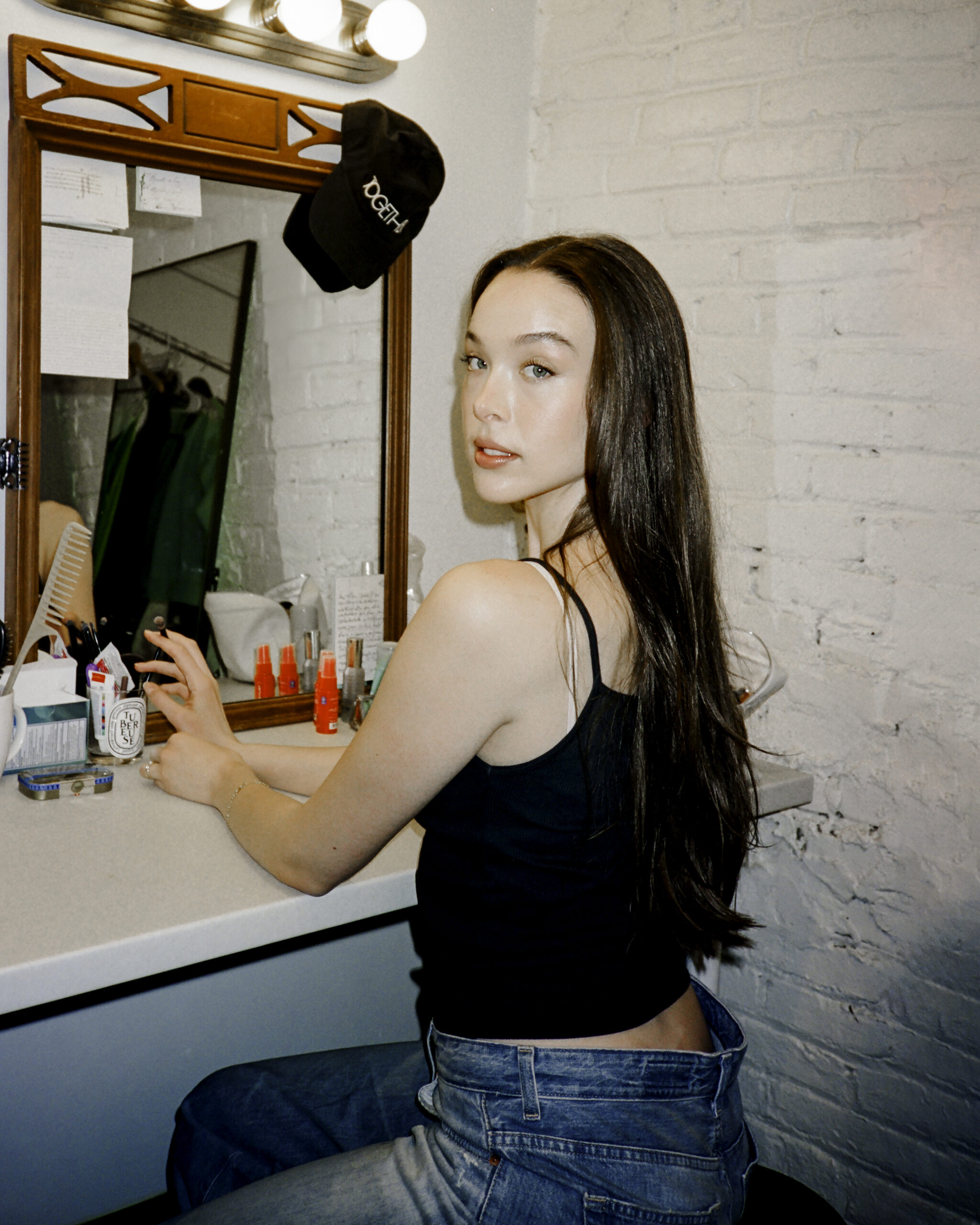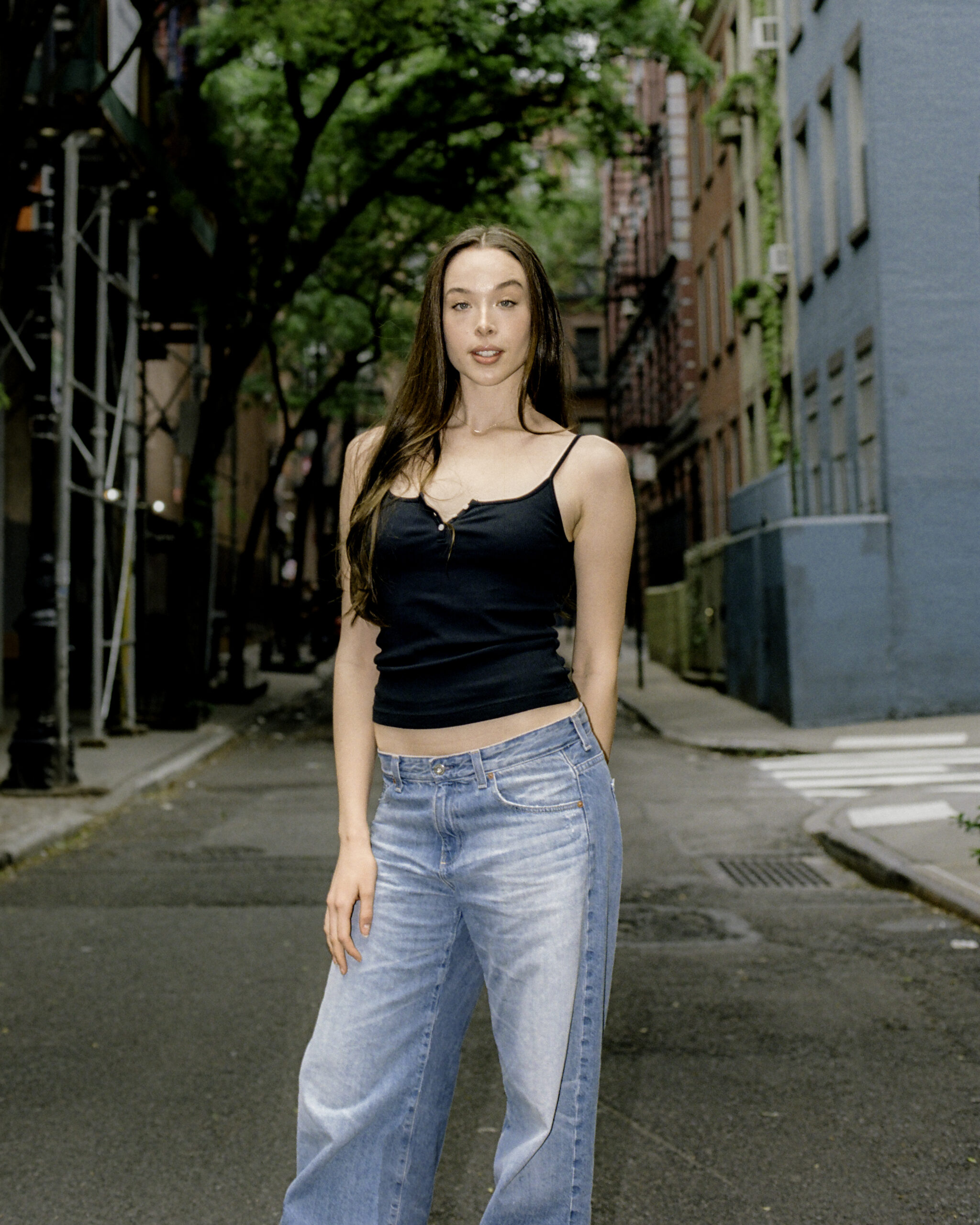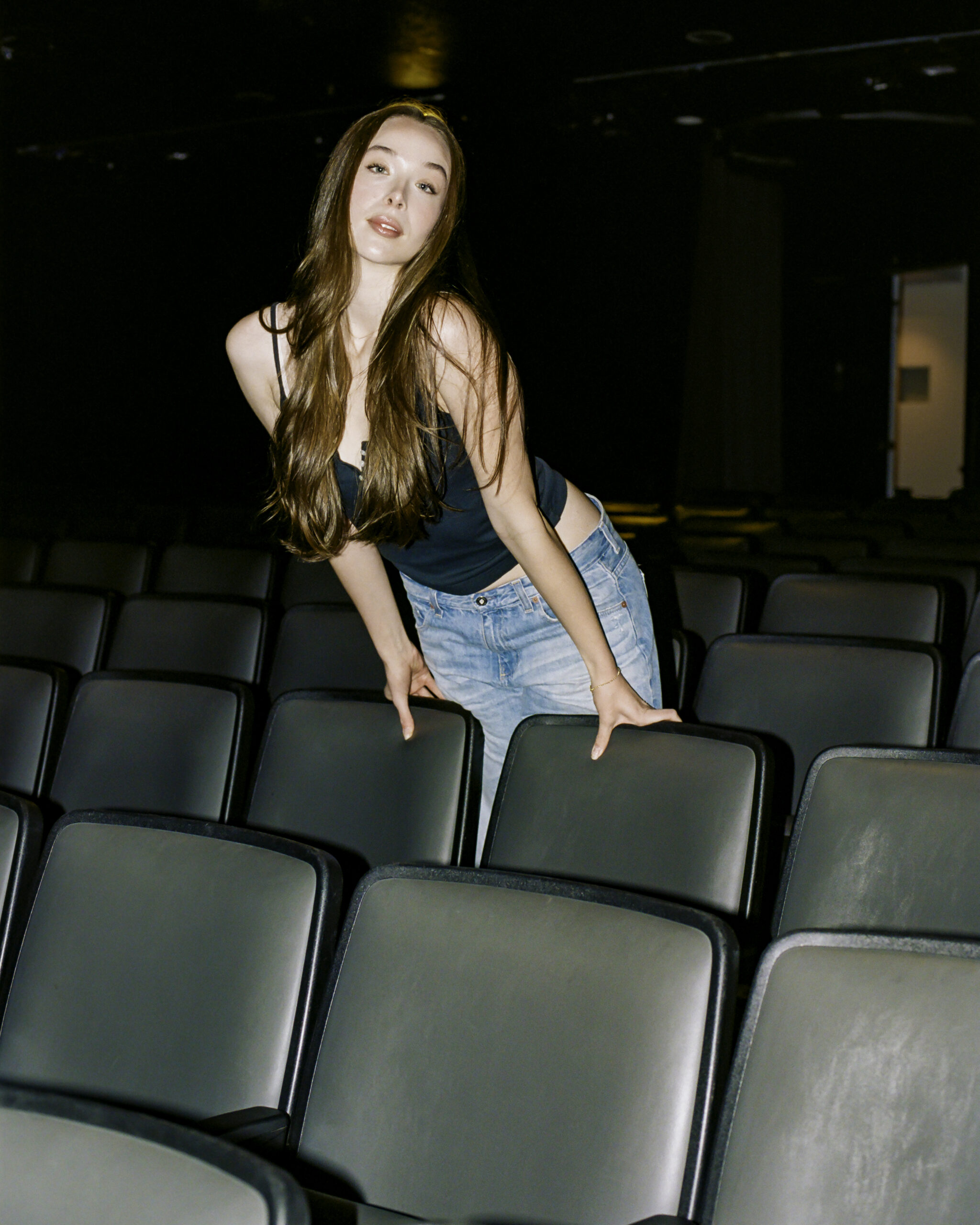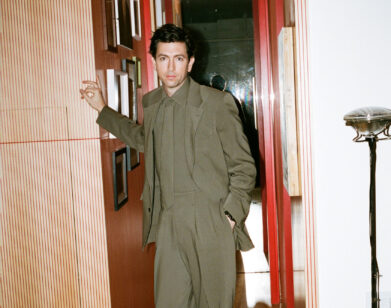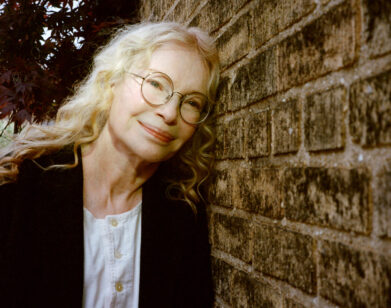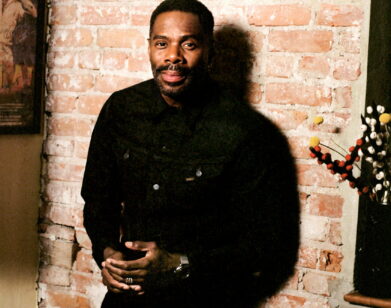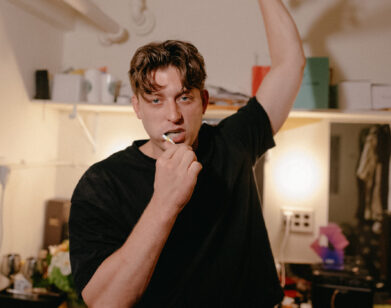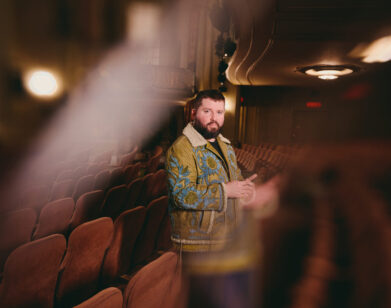BACKSTAGE
Meet Ella Beatty, Daughter of Hollywood Royalty—and Sarah Paulson’s Kindred Spirit
Last Spring, when Elle Fanning left the Broadway production of Branden Jacobs-Jenkins’s play Appropriate to film A Complete Unknown, there was a scramble to fill the role. Initially, Sarah Paulson, who’d later win the Tony Award for her work in the play, was apprehensive about the cast switch-up. But after reading with several young actors, she and co-star Michael Esper felt one in particular had distinguished herself: then-24-year-old Ella Beatty. It was a big break for the young actor, who’d previously appeared in Feud: Capote vs the Swans and happens to be the daughter of two show business legends, Warren Beatty and Annette Bening. It also marked the beginning of an unlikely friendship with Paulson, who hadn’t been aware of the Los Angeles native’s gilded pedigree. “I had no idea who your parents were,” Paulson told Beatty on a Zoom last month. “My interest in you, my estimation of you as a performer, had nothing to do with that.” If more recent events are any indication, Hugh Jackman seems to agree. This year, he’s enlisted Beatty as his co-star in Sexual Misconduct of the Middle Classes, a juicy two-hander about a lecherous professor and his impressionable student currently running at the Minetta Lane Theatre downtown. And though acting opposite a star of Jackman’s caliber is no small task, Beatty has found that retaining a some degree of intimidation has served the production well, given the dynamics at play. “The closer we get to each other and the more familiar we become, I have thought about how important it is to maintain a certain amount of that awe that I have for him as a performer, because it’s in the play,” she explained. After attending the show’s opening night, Paulson called the rising star to gab about lipliner, fire signs, and learning to embrace her parents’ legacies.
———
SARAH PAULSON: They sent me some questions to ask you, which is funny.
ELLA BEATTY: I was wondering if you were going to write the questions or not.
PAULSON: I mean, you think I want to work that hard?
BEATTY: I don’t know. You’re talented like that.
PAULSON: What I think people really should know is that you can put on lip liner without looking at a mirror.
BEATTY: I can, because I’ve lined my lips so many times. I wish I could put it on a resume.
PAULSON: Would you ever chop off your hair?
BEATTY: I would love to chop off my hair. I love my long hair right now, but one day I would do it.
PAULSON: I don’t know who you’d be with short hair.
BEATTY: I would probably be somebody else. I’d probably be a character, and that’s why I would do it.
PAULSON: I think we should set the scene a little bit and just acknowledge a certain reality, which is that we fell in love when we were doing Appropriate in a way that was incredibly real and powerful and magical.
BEATTY: That’s right.
PAULSON: Another wonderful actress named Elle Fanning, whom I love very much and who is also a magical creature, left to go do that movie A Complete Unknown, big fancy movie. We were sad to see her go. I have to admit, in the beginning I was lamenting, “How are we going to find someone to play this part?” Then Michael Esper and I went to the auditions, because we are the ones that have the most to do with you. We read with several actresses and you came in and when you walked out, Michael and I turned to each other and we’re like, “It’s got to be Ella Beatty.” And I remember Lila Neugebauer, our director, was like, “I agree.” How quickly did you get the offer after that?
BEATTY: I think it was the next morning.
PAULSON: It’s so funny to think about that because it’s hard for me to not associate you as a person I’m wildly close to and try to remember what I felt when I first met you. The thing that comes to mind most clearly is self-possessed. First of all, I had no idea who your parents were. My interest in you, my estimation of you as a performer, had nothing to do with that. Your father was a great movie star, but in terms of the current knowledge that some young people have today, your name might not be synonymous immediately with one of the most important actors and directors to ever walk the planet.
BEATTY: That’s true.
PAULSON: If your last name were Bening, it might be a little bit different. But it’s not, so I didn’t know you came from these formidable performers and I was assessing you entirely on your own merit. When you were at Juilliard, did you ever think, “I shouldn’t have my last name?”
BEATTY: No.
PAULSON: Good.
BEATTY: It really never occurred to me until I started working. I do feel a kind of responsibility towards an artistic legacy that I don’t feel ashamed of. I would hope that my work would be powerful enough to offer something specific. I’d hope that my work would be enough to make me separate, but I also understand why people do that.
PAULSON: Did you always want to be an actor?
BEATTY: Always, always.
PAULSON: That’s how I was.
BEATTY: Playing pretend, make-believe, that was the way that I contextualized the world. I think there was a part of me that thought everybody didc that. When your friends come over, doesn’t everybody want to play make-believe? I didn’t work professionally at all until I graduated from acting school, but I knew that that was who I was before I knew it was going to be my profession.
PAULSON: First you were on [Feud: Capote vs.] The Swans.
BEATTY: I did Feud, but Appropriate really changed my life.
PAULSON: Why?
BEATTY: I met some of the people closest to me in my life—I met you. Artistically, I had never had an experience creating a character that way, with that platform, on stage. I had been trained to do that, but I’d never done it.
PAULSON: You hadn’t put it into real use yet.
BEATTY: No. And I had such an abbreviated rehearsal process. We rehearsed when we teched at the Belasco, but I feel like I had to learn on the job, which isn’t something that you typically do with theater.
PAULSON: Traditionally in theater, it’s the total opposite of that.
BEATTY: Right.
PAULSON: What kind of pressure did you feel or not feel coming into this thing that, as you said, was a well-oiled machine?
BEATTY: The pressure that I felt had to do with the responsibility to honor what the other actors are doing. You don’t want to leave people in the lurch. You want to show up and support people, especially if they’ve built something useful. But there was a lot about River [Beatty’s character in Appropriate] that felt instinctive to me. I had affectionate feelings toward her so quickly. I felt so in awe of the entire company and I also felt like, “Okay, they’ve given me this job, so I better show up.” I didn’t have a lot of time to be scared because I got the job and then we started. Everybody was very open with me. Everybody was really receptive and loving.
PAULSON: Except for me. I wanted you to do exactly what Elle had done.
BEATTY: Sarah, the experience of working with you and doing a play with you every night, and then also having the love story of our friendship, was magical and singular. I don’t know how often in my life I’m going to be given the opportunity to bear witness to someone in the way that I did when we were doing Appropriate. As an actress, the gift was very potent and special to me and I miss it.
PAULSON: I think about it all the time. I’m just like, could we do it in Des Moines? I’ll just go anywhere if we can all be together.
BEATTY: Anywhere. It’s such a magical play.
PAULSON: I paid you a lot of money to say that.
BEATTY: Yeah, my Venmo is… [laughs].
PAULSON: Now you’re doing this play with one of both the most celebrated, beloved theater performers who happens to be Wolverine and a big fat movie star, Hugh Jackman. I got to see the play on opening night, it was one of the great experiences of my audience-going life to see you do that play. I practically levitated out of my seat. But to go back to how self-possessed you are as a human being, was there any part of you that was dealing with the star power of that? I was not nearly as good as you are at your age, and I don’t know if I’m as good as you are at my age now. But I certainly couldn’t have done what you’re doing with him.
BEATTY: There is nobody less movie starry in the world than Hugh Jackman. He’s the most generous, loving, open, kind, hardworking person. He’s done so much musical theater and you can see that in the way that he shows up to work. Nobody works harder than musical theater performers—they’re such athletes. You can see that in his sensibility around learning lines. So I was intimidated, but when we sat down to do the first reading of the play in the fall, it was so animated immediately that it became about the play very quickly. We felt like we needed to do it. In the play, he plays a famous author, so that admiration and “gasp”—
PAULSON: That’s a real word you like to use.
BEATTY: I love to use the word “gasp” in conversation. But anyway, some of that isn’t actually bad for the play. The closer we get to each other and the more familiar we become, I have thought about how important it is to maintain a certain amount of that awe that I have for him as a performer because it’s in the play.
PAULSON: Well, there’s a lot of complicated themes in the play. One of the things I loved about it is it’s incredibly nuanced. Much like life, nothing is really black and white. The play is a real ride in terms of things changing constantly because it takes place over a certain period of time. Where does all of that live inside you?
BEATTY: One thing I love about doing this play is that it’s a very solid, consistent story. No matter what the audience’s experience might be, which can vary night to night, we can play our scenes the way we rehearsed them and intended them to be played, with spontaneity inside of it. I don’t feel like I’m relying on an audience to have a certain experience of the play in order to do it.
PAULSON: Well, sometimes in Appropriate, we would all come off after the first act and be like, “Is this an audience full of dead people?”
BEATTY: That’s right. That character, River, evoked different kinds of reactions from people because she was so eccentric. I could tell certain nights they took her more seriously, certain nights she was more of an oaf.
PAULSON: Whereas with this play, your assessment of your work or how it landed is not as dictated to you by the audience.
BEATTY: No. Which is liberating, because then you have whatever emotional experience of this play you want to have. I find myself being sensitive and tender with this character in a different way. She feels like a best friend, whereas River felt more like a funny friend of a friend that you see once every couple months. She is a hoot, but she didn’t feel like me.
PAULSON: We are so early in your career, which is why I selfishly feel lucky that I got to see you take the stage for the first time. So far in your work endeavors, has this character felt the closest to you?
BEATTY: I think her inability to not tell the truth is something I relate to. I am not a good liar. I have a hard time not being totally earnest. So I would say yes, she feels like the closest to me. She also feels different from me, though. It’s a relief to come to work and remember you’re being someone else. Do you ever experience that? You are someone who is so talented at understanding and communicating human behavior that is cherry-picked from your own experience in life, but you have a way of understanding that they’re not you.
PAULSON: My hope, and the reason why I think there’s a nobility in the pursuit of this career-wise that has nothing to do with fame or fortune, has to do with the opportunity to reveal human behavior to other human beings so that they can then feel less alone on the planet. That’s such an incredible thing to choose to spend your life doing.
BEATTY: That’s such a powerful thing to be able to do, to step into somebody’s experience and not judge it.
PAULSON: I got very lucky earlier in my career. I worked with Steve McQueen on 12 Years a Slave, where I was playing an unforgivable woman who behaves in ways that were just unconscionable. Steve McQueen said to me, “The consequences of you trying to play this with any sense of regret, remorse, a desire to be liked or understood by the audience will actually hurt the storytelling.” She was one of those people who couldn’t reflect on her own behavior. She was interested in her own selfish pursuits. As a human being, I very much care about how someone responds to me in a way that’s almost crippling. But somehow, I’m able to bifurcate in my work. I don’t give a shit if you like me, all I care about is that I have given enough consideration to what I’m doing that there’s an opportunity for you to understand why the character behaves the way she does.
BEATTY: Absolutely.
PAULSON: I don’t care about engendering good feeling from an audience. I think that’s helpful when you get asked to play some of the people I’ve been asked to play.
BEATTY: Do you think that you’re attracted to characters who have a more unapologetic way of relating to the world because you’re a person who takes tremendous care and is so kind?
PAULSON: Boy, I paid you so much.
BEATTY: Again, my Venmo is…
PAULSON: I have never thought about that consciously. It’s not because it’s effortful for me to care about my friends, but I wonder if there is something liberating about not having to hold that, because the other thing I’m trying to hold—the truth of the character and wanting to deliver that as truthfully as possible—trumps the feeling of worrying about being liked. It’s a heavy load to carry, to worry about being liked.
BEATTY: Also, that’s part of why we have this intuitive understanding of each other, because you are a Sagittarius and I am an Aries. I would like to use this moment to promote that bond and connection. Any Sagittarius and Aries out there, I hope you find each other.
PAULSON: It’s the most magical place, man. You let me be a nut bag but you can also pop right off.
BEATTY: I think that’s a fire sign thing in general.
PAULSON: Shout out to astrologers everywhere.
BEATTY: Neither of us actually know anything about astrology.
PAULSON: We just know what each other and it works for us.
BEATTY: Exactly.
PAULSON: On a lighter note, what is your nightly routine? You are doing the show in rep, so you actually have some nights off. You’re not doing eight shows a week anymore, right?
BEATTY: No, not anymore. I’m really enjoying having time off, I can see my people more, which I love so much. Most nights off that I have, you will catch me at home. But I’m finding being away from the play really hard. I love the characters and I miss it when I’m away from it. Sometimes we have four or five days between performances and I get really nervous. And our director, Ian Rickson, made this incredible sort of diary book of images and musings and writings from his rehearsal process, so I’ll take that home with me so I can look at that.
PAULSON: And stay inside the play somehow.
BEATTY: Yes. It’s part of what makes him so dreamy and powerful as a director. He has such an acute understanding of what actors need.
PAULSON: I’m so jealous. That makes me salivate.
BEATTY: Come do it with us. I would die to do another play with you.
PAULSON: We have to do another play. Let’s call anyone.
BEATTY: Anyone who will listen.
PAULSON: “We would like to do another play together.”

